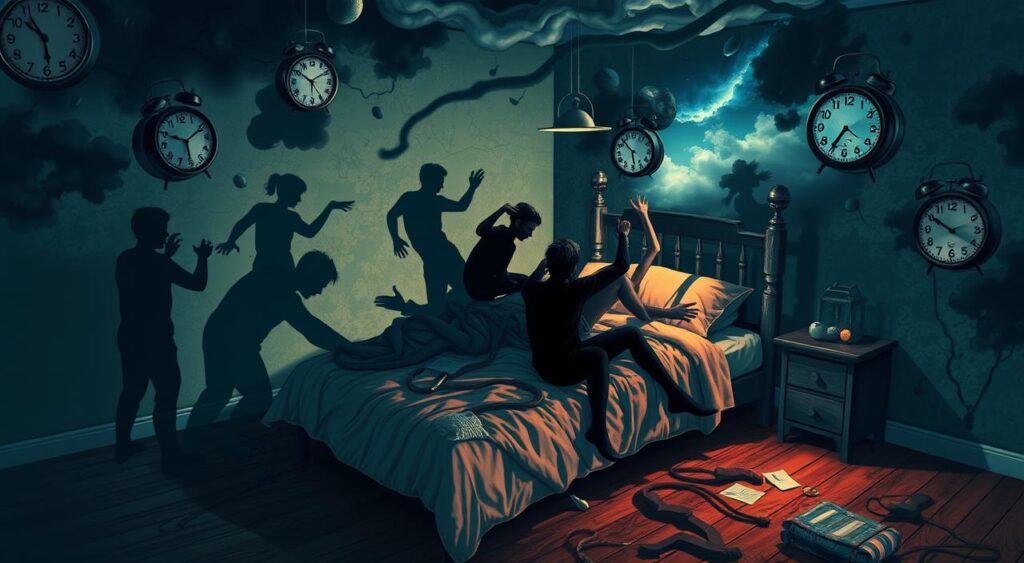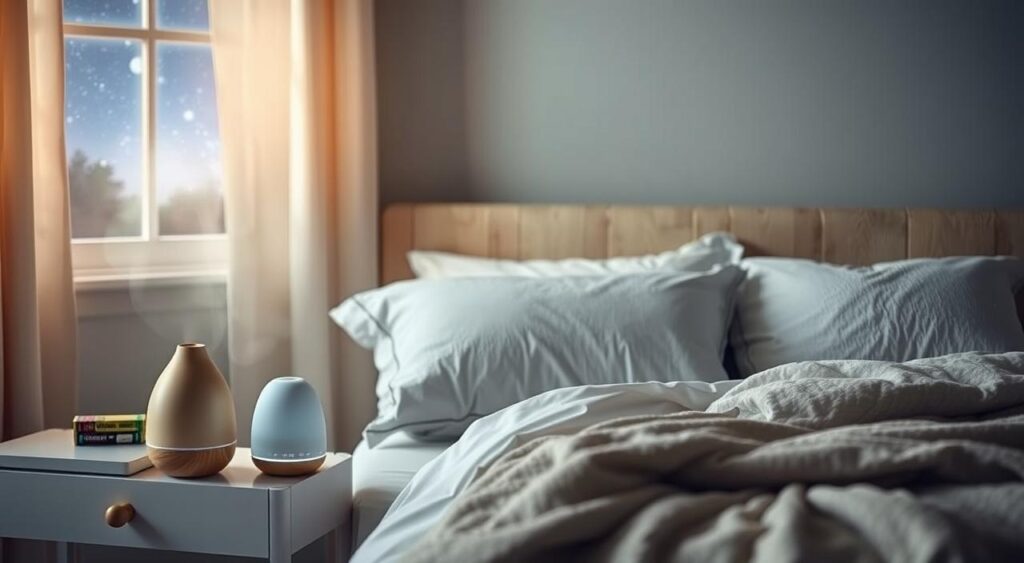Navigating the complexities of sleep-wake disorders. Discover effective strategies to optimize your sleep-wake cycle.
A staggering 30% of people face sleep-wake disorders, affecting daily life and health. These disorders, including circadian rhythm sleep disorders, impact millions globally. They lead to fatigue, lower productivity, and higher risks of chronic diseases. It’s vital to understand and manage these conditions to improve sleep and health.

Sleep-wake disorders can mess up daily routines, causing trouble with focus, mood, and relationships. It’s crucial to address these issues to enhance quality of life. Recognizing the signs and symptoms of sleep-wake disorders, like circadian rhythm sleep disorders, is the first step to seeking help and managing them well.
Key Takeaways
- Sleep-wake disorders affect a significant portion of the population, causing fatigue and decreased productivity.
- Circadian rhythm sleep disorders are a type of sleep-wake disorder that can disrupt daily routines.
- Understanding and managing sleep-wake disorders is crucial for improving sleep quality and overall health.
- Sleep-wake disorders can cause mood disturbances, strained relationships, and decreased concentration.
- Recognizing the signs and symptoms of sleep-wake disorders is essential for seeking help and managing the condition effectively.
- Effective management of sleep-wake disorders can improve overall well-being and quality of life.
Understanding Sleep-Wake Disorders
Sleep-wake disorders like insomnia and sleep apnea really affect people’s lives. They make it hard to sleep well, leading to tiredness and less focus during the day. This can also raise the chance of accidents and mistakes.
Insomnia makes it tough to fall or stay asleep. Sleep apnea causes breathing pauses during sleep, making people feel very tired in the day. Both can harm daily life, causing problems with thinking, mood, and health risks.
Definition and Basic Concepts
Sleep-wake disorders mess with our natural sleep cycle, or circadian rhythm. This cycle is controlled by our body’s internal clock, which responds to light and dark. When this cycle gets disrupted, it can lead to sleep problems.
Impact on Daily Life
Sleep disorders can really mess up daily life. People with these issues might find it hard to focus, remember things, and react quickly. This makes simple tasks hard. It can also hurt relationships, work, and overall happiness, leading to a lower quality of life.
Common Risk Factors
Some things can make you more likely to get sleep disorders. Getting older, having a family history, and certain habits can play a part. For example, older people are more at risk for sleep apnea. Irregular sleep, too much caffeine, and using screens before bed can also cause problems.
The Science Behind Your Sleep Cycle
Understanding sleep cycles is key to dealing with sleep-wake disorders. Your body has an internal clock, controlled by the circadian rhythm. This clock adjusts to light and dark to keep your body in sync with day and night.
Circadian rhythm sleep disorders happen when your internal clock gets out of sync. This can make it hard to fall asleep, stay asleep, or feel too tired during the day. Travel, late work hours, or too much artificial light can mess with your circadian rhythm, causing sleep-wake disorders.
Several things can affect your circadian rhythm and lead to sleep-wake disorders. These include:
- Light exposure: Natural light-dark cycles help regulate the internal clock.
- Physical activity: Regular physical activity can help synchronize the circadian rhythm.
- Sleep schedule: Irregular sleep schedules can disrupt the body’s internal clock.
Knowing how sleep cycles work and what affects your circadian rhythm helps prevent or manage sleep-wake disorders. This knowledge is vital for keeping a healthy sleep-wake cycle and lowering the risk of circadian rhythm sleep disorders.
| Disorder | Description |
|---|---|
| Circadian Rhythm Sleep Disorders | Disorders that occur when the body’s internal clock is out of sync with the external environment. |
| Sleep-Wake Disorders | Disorders that affect the normal sleep-wake cycle, including insomnia, narcolepsy, and sleep apnea. |
Common Types of Sleep-Wake Disorders
Sleep-wake disorders can really affect a person’s life. There are many types, each with its own traits. Narcolepsy is a brain disorder that messes up sleep patterns, causing too much daytime sleepiness.
Other disorders include insomnia, sleep apnea, and issues with the body’s clock. Restless legs syndrome makes people want to move their legs a lot because of weird feelings. This can mess up sleep and make sleep disorders worse.
- Insomnia: trouble falling or staying asleep
- Sleep apnea: breathing stops during sleep
- Circadian rhythm disorders: irregular sleep patterns
These disorders can really mess up daily life. It’s important to see a doctor if symptoms don’t go away.
Knowing about different sleep disorders is key to getting help. By understanding each disorder, people can start managing their sleep better.
Recognizing the Signs and Symptoms
Finding out if you have a sleep-wake disorder can be hard. Sleep-wake disorders mess with your sleep cycle, causing you to feel tired all day, have trouble sleeping, and more. Parasomnias are a type of sleep disorder that makes you move or act strangely while you’re asleep.
Some common signs and symptoms of sleep-wake disorders include:
- Difficulty falling or staying asleep
- Excessive daytime sleepiness
- Abnormal movements or behaviors during sleep, such as sleepwalking or talking
- Difficulty concentrating or paying attention
- Mood disturbances, such as irritability or depression

Parasomnias, like sleepwalking or talking, might mean you have a sleep disorder. These can be treated with changes in your lifestyle, therapy, and medicine. Spotting the signs of sleep-wake disorders and parasomnias is the first step to better sleep and health.
| Condition | Signs and Symptoms | Treatment Options |
|---|---|---|
| Sleep-Wake Disorders | Excessive daytime sleepiness, insomnia, abnormal movements during sleep | Lifestyle modifications, behavioral therapies, medication |
| Parasomnias | Sleepwalking, sleep talking, abnormal movements during sleep | Behavioral therapies, medication, lifestyle modifications |
Diagnostic Approaches and Testing Methods
Getting a correct diagnosis is key for treating sleep disorders like hypersomnia and sleep apnea. Doctors use different methods to find out what’s causing sleep problems.
Sleep studies, like polysomnography, track brain activity, heart rate, and breathing while you sleep. They help spot sleep apnea, which stops breathing many times during sleep. Doctors also do physical exams and look at your medical history to diagnose sleep disorders.
Sleep Studies and Monitoring
Sleep studies watch how you sleep in a lab or at home with portable devices. They help doctors find sleep issues and diagnose hypersomnia, which makes you very sleepy during the day.
Self-Assessment Tools
Tools like sleep diaries and questionnaires help you track your sleep. They give doctors insights into your sleep habits. This helps them create treatment plans for sleep apnea and hypersomnia.
Doctors use sleep studies, medical checks, and self-assessment tools together. This way, they can accurately diagnose sleep disorders. Then, they can make treatment plans to help you sleep better and feel healthier.
Treatment Options and Medical Interventions
Many people struggle with insomnia and circadian rhythm sleep disorders. Personalized treatment plans are key to helping each person. These plans might include lifestyle changes, behavioral therapies, and medical treatments.
For insomnia, treatments can be:
- Cognitive-behavioral therapy for insomnia (CBT-I)
- Relaxation techniques, such as progressive muscle relaxation and mindfulness meditation
- Sleep restriction and stimulus control
For circadian rhythm sleep disorders, treatments might include:
- Light therapy to regulate the body’s internal clock
- Chronotherapy to adjust the sleep schedule
- Melatonin supplements to regulate sleep-wake cycles

Seeing a healthcare professional is crucial to find the right treatment. With the right plan, people can sleep better and feel better overall.
| Treatment Option | Description |
|---|---|
| Cognitive-behavioral therapy for insomnia (CBT-I) | A non-pharmacological approach to address underlying thoughts and behaviors contributing to insomnia |
| Light therapy | A treatment that uses exposure to bright light to regulate the body’s internal clock |
Lifestyle Modifications for Better Sleep
Managing sleep-wake disorders needs a full approach that includes lifestyle changes. Simple daily habits can greatly improve sleep quality. This is key for those with sleep apnea, as a good sleep routine can ease symptoms.
Having a regular sleep schedule is key. Set a fixed bedtime and wake-up time, even on weekends. A dark, quiet, and cool sleep space is also crucial. Avoiding caffeine and screens before bed helps too.
Sleep Hygiene Practices
Good sleep hygiene is essential for managing sleep disorders. Avoid daytime naps to keep nighttime sleep better. Relaxing activities before bed, like reading or meditation, signal it’s time to sleep.
Environmental Adjustments
Environmental changes can also improve sleep. Use earplugs or white noise machines for quiet. A comfy mattress and pillows help relax. These changes create a sleep-friendly environment.
Diet and Exercise Considerations
A healthy diet and regular exercise boost sleep quality. Eat light meals before bed and stay active. These lifestyle changes, along with other treatments, can manage sleep apnea and disorders. This leads to better health and well-being.
Managing Sleep-Wake Disorders in Special Populations
Dealing with sleep-wake disorders is tough for certain groups. This includes kids, teens, older adults, and those who work shifts. These groups face special challenges that make sleep disorders worse, like shift work sleep disorder and restless legs syndrome.
Shift workers, for example, are more likely to get shift work sleep disorder. This can cause tiredness, lower work performance, and higher accident risks. Older people might get restless legs syndrome, which messes up their sleep and life quality.
Children and Adolescents
Kids and teens are also at risk for sleep disorders, especially when they’re growing fast. A regular sleep schedule and a good sleep space can help.
Elderly Individuals
Older folks face sleep changes due to age, like less melatonin and being more sensitive to noise and light. Changing lifestyle and getting medical help can improve their sleep.
Shift Workers
Shift workers need special plans to manage their sleep. This might include changing their sleep schedule, using light therapy, and avoiding activities that get them excited before bed. This helps avoid shift work sleep disorder and restless legs syndrome.
By understanding the unique challenges of these groups and using specific strategies, people can manage their sleep disorders better. This improves their life quality.
| Population | Sleep-Wake Disorder | Strategies for Management |
|---|---|---|
| Children and Adolescents | Insomnia, Sleep Apnea | Establish consistent sleep schedule, create sleep-conducive environment |
| Elderly Individuals | Restless Legs Syndrome, Sleep Apnea | Lifestyle modifications, medical interventions, light therapy |
| Shift Workers | Shift Work Sleep Disorder, Restless Legs Syndrome | Adjust sleep schedule, use light therapy, avoid stimulating activities before bedtime |
Natural Remedies and Alternative Therapies
For those with sleep-wake disorders like insomnia, natural remedies and alternative therapies can help. They offer a way to complement traditional medical treatments. These methods can ease symptoms and boost sleep quality.
Some natural remedies for insomnia include melatonin supplements, valerian root, and aromatherapy. Also, acupuncture and yoga can help regulate the body’s internal clock. They promote relaxation too.
- Mindfulness meditation
- Progressive muscle relaxation
- Herbal teas, such as chamomile and lavender
It’s important to remember that these remedies and therapies are not a replacement for medical treatment. People with sleep-wake disorders should talk to a healthcare professional before trying new therapies.
By adding natural remedies and alternative therapies to their treatment, people with sleep-wake disorders can manage their symptoms better. This approach can improve their sleep health overall.
When to Seek Professional Help
Knowing when to get help for sleep problems is key. Sleep apnea and narcolepsy need expert care to avoid serious issues. This care helps improve your life quality.
People with loud snoring or pauses in breathing might have sleep apnea. Those who fall asleep suddenly during the day could have narcolepsy. Without treatment, these problems can cause heart disease, diabetes, and depression.
Emergency Warning Signs
Some sleep disorders are life-threatening. If you have trouble breathing, chest pain, or lose consciousness, get help right away. These signs need emergency care.
Choosing a Sleep Specialist
It’s important to find a sleep specialist for help. They can figure out what’s wrong and create a treatment plan just for you. Ask your doctor for a referral or look for specialists in your area.
What to Expect During Consultation
Your sleep specialist will do a full check-up at first. This includes a physical exam, medical history, and a sleep questionnaire. They might also do sleep studies to find out what’s wrong. Be ready to talk about your sleep, symptoms, and health history to get the right treatment.
Conclusion: Taking Control of Your Sleep Health
Managing sleep-wake disorders starts with understanding their causes and symptoms. Recognizing signs like daytime sleepiness or trouble falling asleep is the first step. Circadian rhythm sleep disorders can greatly affect daily life, making sleep health a top priority.
Healthy sleep habits, like a regular sleep schedule and a good sleep environment, can help. Staying updated on sleep medicine research helps make better sleep choices. Seeking help or making lifestyle changes are key to better sleep health.
Valuing sleep health and actively managing sleep disorders can greatly improve life quality. As sleep research grows, staying informed and adapting to new findings is crucial. This way, we can control our sleep and live a healthier, more balanced life.
FAQ
Q: What are sleep-wake disorders and how do they affect daily life?
A: Sleep-wake disorders, or sleep disorders, affect how well and long you sleep. They can cause problems like insomnia and sleep apnea. This can make you feel tired, less productive, and affect your mood.
Q: What is the difference between insomnia and sleep apnea?
A: Insomnia makes it hard to fall or stay asleep. Sleep apnea causes breathing to stop and start while you sleep. Both can hurt your sleep quality and health.
Q: How do circadian rhythm sleep disorders affect the body’s internal clock?
A: Circadian rhythm sleep disorders mess up your body’s sleep schedule. This can cause problems like narcolepsy and restless legs syndrome. Keeping a regular sleep schedule is key.
Q: What are parasomnias and how do they relate to sleep-wake disorders?
A: Parasomnias are sleep disorders that cause odd movements or behaviors while you sleep. They can be linked to other sleep disorders like hypersomnia and sleep apnea. Getting professional help is often needed.
Q: How are sleep-wake disorders diagnosed and what testing methods are used?
A: Doctors use sleep studies, medical checks, and self-assessment tools to diagnose sleep disorders. These help find problems like hypersomnia and sleep apnea. This info helps doctors create treatment plans.
Q: What are the treatment options for sleep-wake disorders and how can lifestyle modifications help?
A: Treatments include medicine, lifestyle changes, and alternative therapies. Simple changes like better sleep habits and a healthy diet can improve sleep. This helps manage issues like insomnia and circadian rhythm disorders.
Q: How do shift work sleep disorder and restless legs syndrome impact special populations?
A: Shift work sleep disorder affects those working odd hours, causing sleep problems. Restless legs syndrome also impacts certain groups, especially those working shifts. Tailored management strategies are needed for these groups.
Q: When should I seek professional help for sleep-wake disorders and how do I choose a sleep specialist?
A: Get professional help for sleep disorders if you have severe sleep issues or health problems. Choose a sleep specialist based on their experience with sleep apnea and narcolepsy. Look for recommendations from doctors or sleep centers.
